Note: This article was originally published in Substack on 22 Mar. 2024
In The Arc of Life, the journey entails the following: Freedom, Responsibility, Adventure.
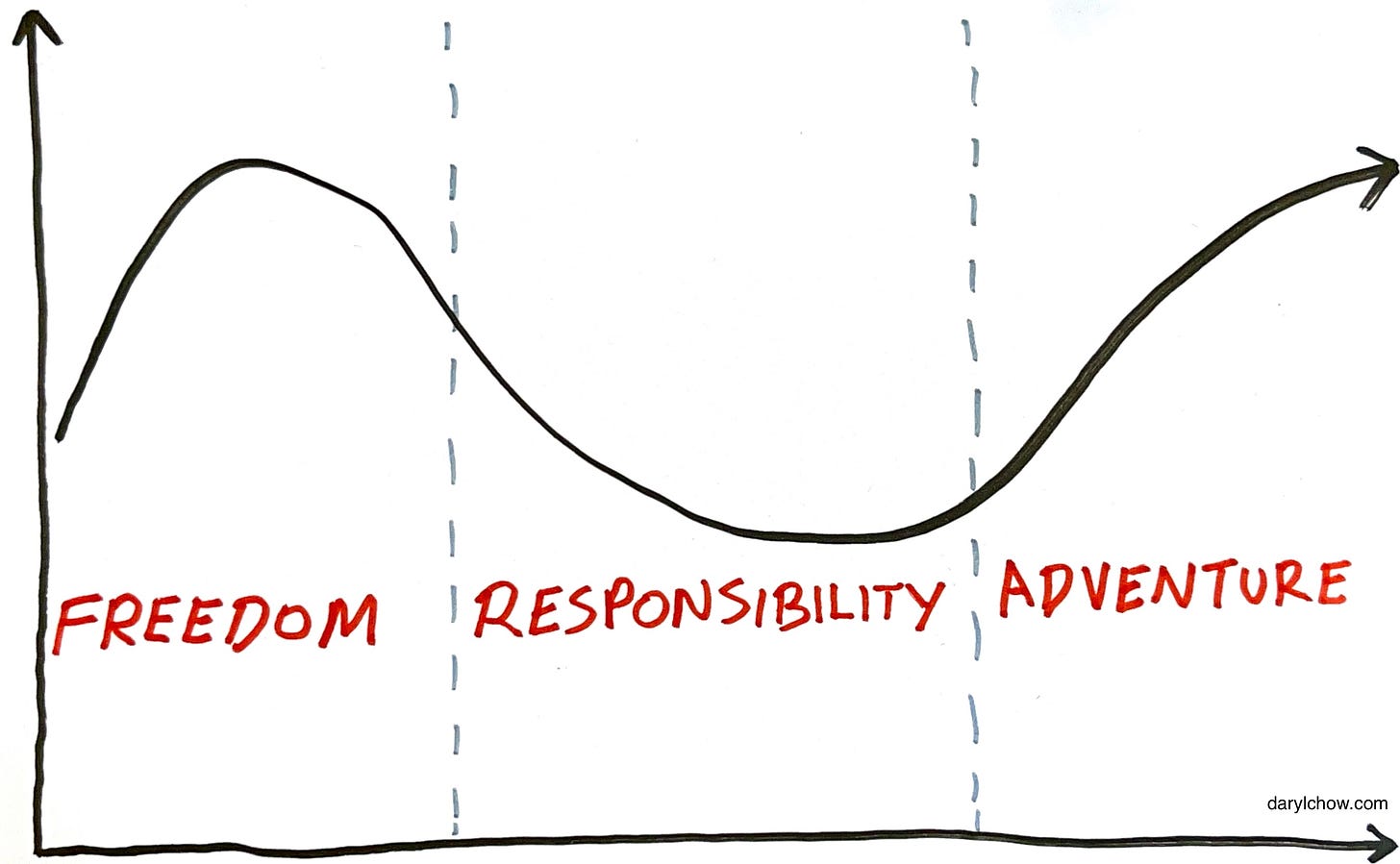
The Arc of Life is not a prescriptive formula, but rather, it is meant to serve as a “form”, a structure to help you think through the stages of development as you cross between worlds, providing you perspective as you make key transitions and changes in your life.
Let’s go through each of the three phases.
Freedom
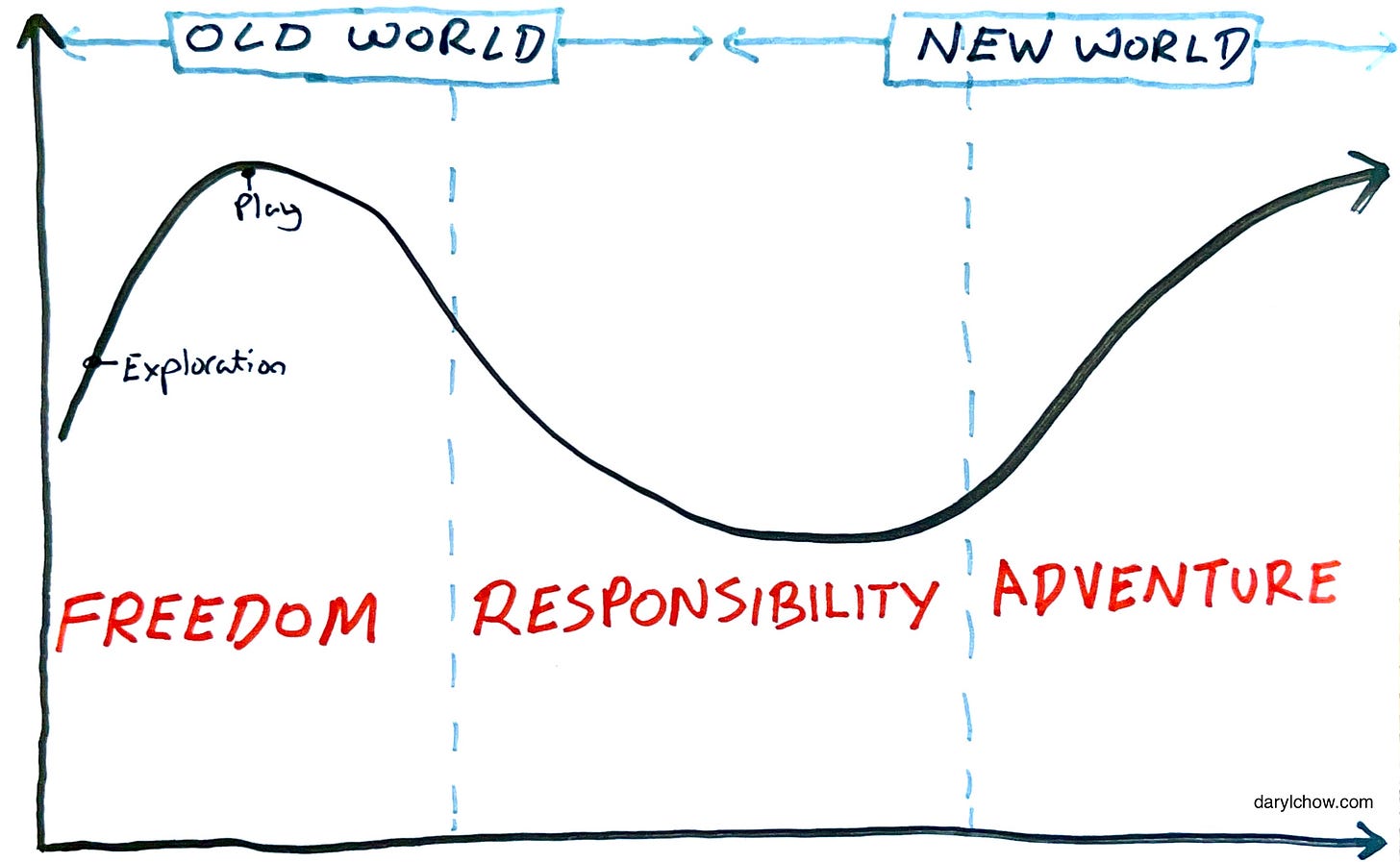
“Chemical elements do not choose which way to combine. Genes do not make decisions,” said the late Rabbi Jonathan Sacks. “But we are free; we do choose. We do make decisions…(Freedom is) God’s most fraught and fateful gift.”1
When we embark on this voyage of leaving our old world behind, we are exercising the gift of freedom. The freedom from the past that binds us, as well as the freedom to engage in the choices we make. What a liberating feeling to be free from limiting beliefs, old narratives, and fears that held us back. Fear is not longer a headwind but a tailwind.
Most of us would be familiar with the image of the Statue of Liberty, a gift from France to America in 1886, commemorating the two nations’ friendship and shared love of freedom.
But have you ever noticed that she isn’t standing still? The statue’s right foot is actually lifted, as if in mid-stride, as if to say, “Liberty is on the move.” Yet, paradoxically, as noted by German psychoanalyst Erich Fromm, the fear of freedom can sometimes grip a hold on us. Nevertheless, we are invited to exercise our freedom for play, freedom to explore and discover the world within and without.
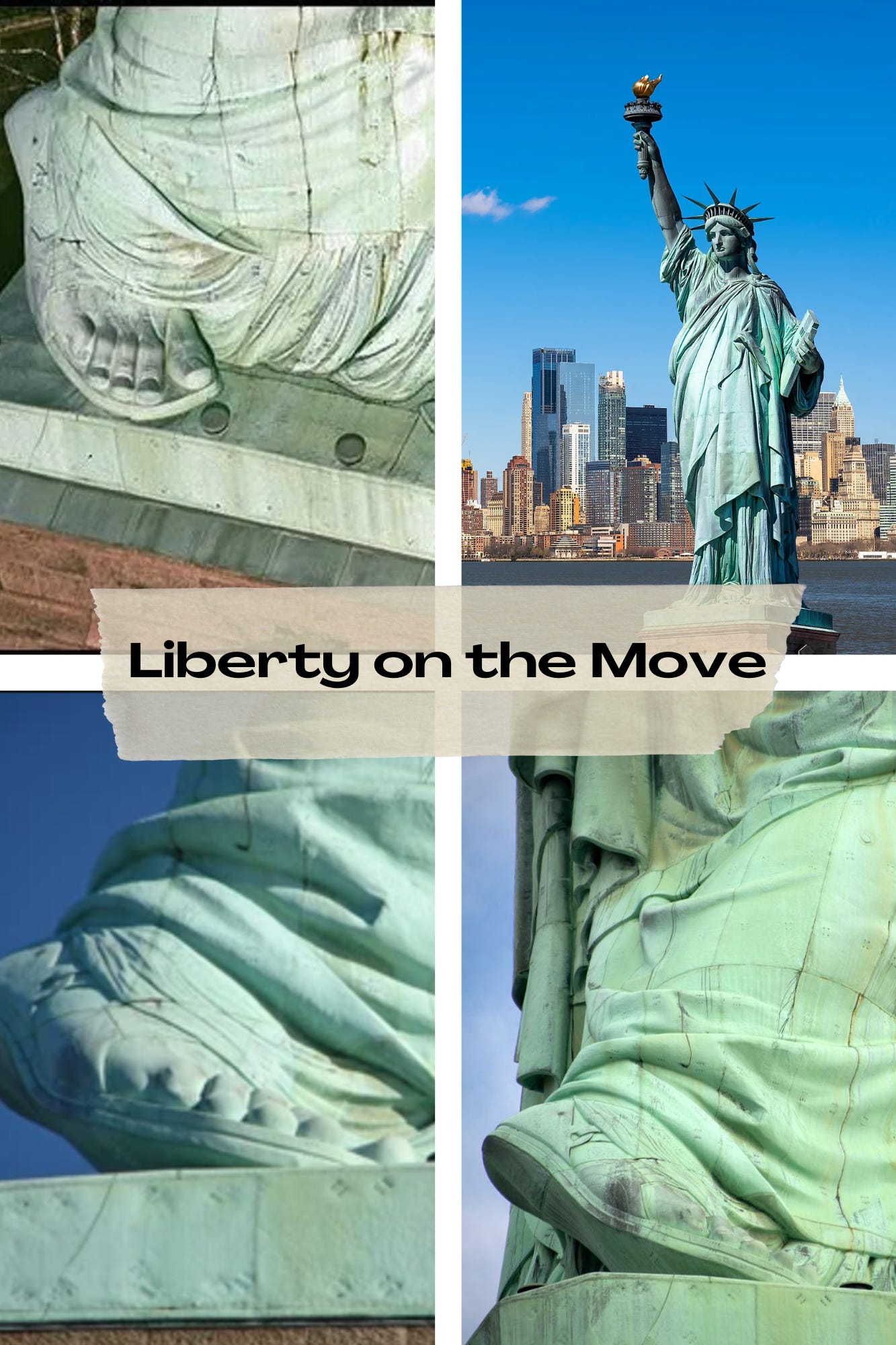
Responsibility
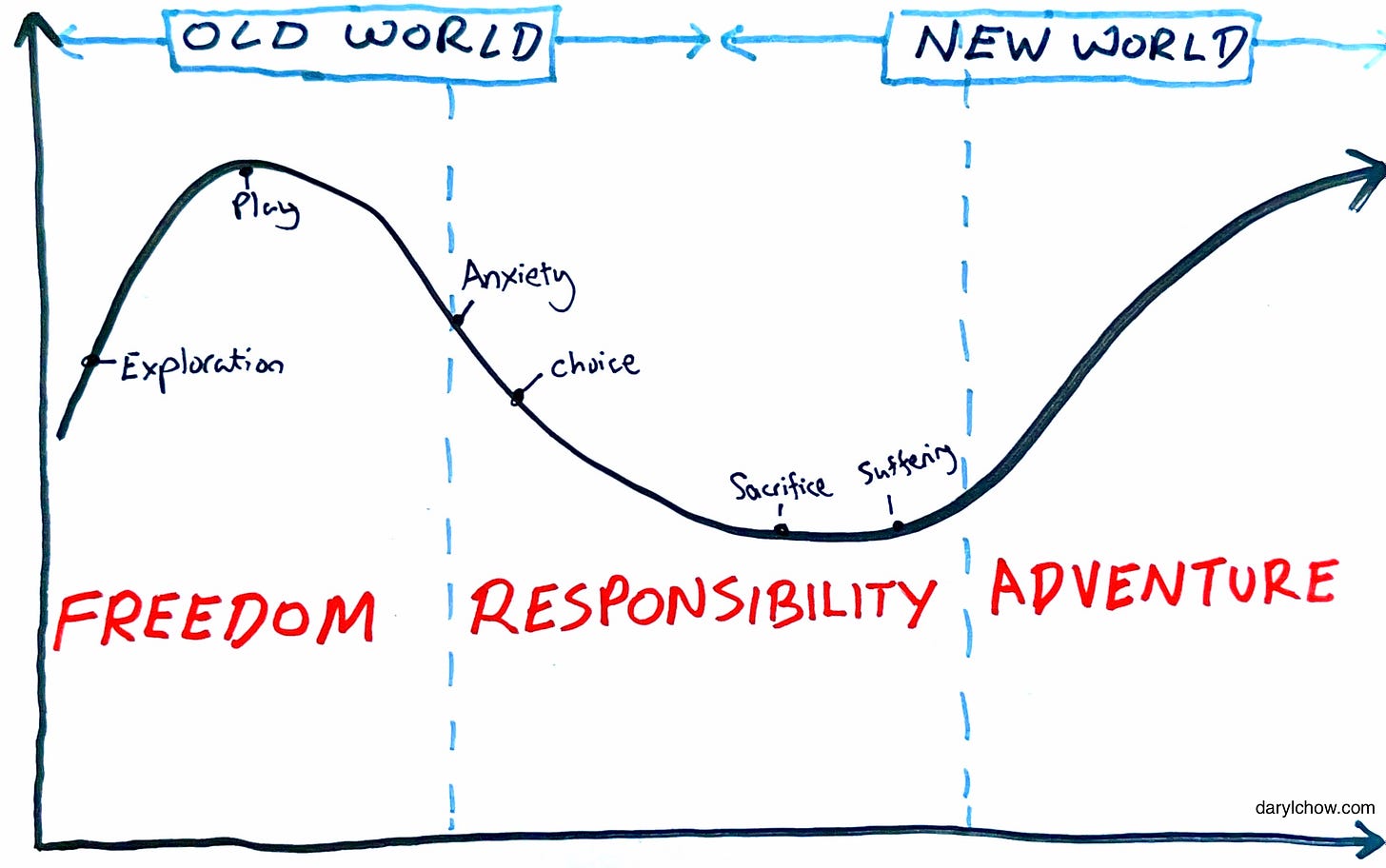
As we come of age and reckon with the freedom at our disposal, we enter into a new phase. At this arc of the journey, we begin to comprehend that liberty begets responsibility. With the choices that we make—willingly—we learn that the territory of responsibility comes sacrifices. You can’t have it all. You can pursue anything you want, but not everything. Freedom asks for the partnership of responsibility. This means to take on the obligations of self-control and regard for others.
When we think about these two phases of Freedom and Responsibility, author Ryan Holiday incisively pointed out, “We don’t have a freedom problem: we have a responsibility problem.” What Holiday was referring to is that we have over-inflated the value of freedom at the expense of responsibility. “Responsibility is understanding yourself as belonging to something larger than yourself.” Our responsibility is to see beyond just individual good, but the common good of all, shifting the lens from “I” to “We.”2
Austrian psychiatrist and Holocaust survivor Viktor Frankl said,
“When we look upon human life without the blinkers of preconception, we must conclude that both consciousness and responsibleness play the basic roles in the drama of existence…Being human means being conscious and being responsible.”3
Curiously, after 75 years after the statue of Liberty was inaugurated in New York Harbour on the East Coast , another statue was proposed to be erected on the West Coast.. It was to be called “The Statue of Responsibility,” symbolising the flipside of America’s prized virtue. This was the brainchild of Viktor Frankl. He said,
Freedom, however, is not the last word. Freedom is only part of the story and half of the truth. Freedom is but the negative aspect of the whole phenomenon whose positive aspect is responsibleness. In fact, freedom is in danger of degenerating into mere arbitrariness unless it is lived in terms of responsibleness (emphasis mine). That is why I recommend that the Statue of Liberty on the East Coast be supplemented by a Statue of Responsibility on the West Coast.4
Features of Responsibility include sacrifices, pain and suffering. Ask any parent, and they will tell you about the heartaches and the headaches. Because parenting is an amateur sport, the moment you think you turned “pro.” the rules change5. Any cross that you that bear upon yourself, necessitates sacrifices that you have to make. When you become a parent, you make the instinctive sacrifice of thinking of your own needs 24/7. Your attention turns to the cute and utterly helpless baby in your arms.
The road of Responsibility is difficult. Yet, pain is a teacher. Known as hormesis in the world of science, this biological phenomenon in which right-sized doses of stressors produces a beneficial effect; not too little and not too much. This is why, self-imposed stressors of doing something challenging (e.g., lifting weights, running, confronting your fears, learning a new skill) helps us grow. As we like to say, “No pain, no gain.”
Hormesis is Greek for ‘to set in motion.’ The feeling of being in motion, pushing forward in the right direction, not only re-moralises and re-energises you, but the “effort equals to reward” also dampens the pain. Pain specialist and Pediatric emergency physician Amy Baxter noted that as a “gate control,” motion is effective at “shutting the gate” on sharp pain. She added, “Choosing what to focus on increases control. Fear and control are the volume knobs for pain.” Although Baxter was speaking about physical pain, I suspect this is also related to psychic pain.
If we take up the cross of responsibility, where does this lead us to this in the arc of life?
Adventure
When we put out the sail and move forward willingly and embrace the responsibilities that come with it, an adventure of our lives await for us.
When we look back at the journey that we have undertaken, meaning comes to us retroactively. Things start to make a bit more sense. In this third phase, an adventure is calling out for you. It is unclear what the path will look like exactly, but so does the holiday trip to Europe. You know roughly where you’d go and what you’d do—but not exactly. That’s precisely the point of an adventure: To go somewhere new.
Spiritual and Emotional Bypass
There are those think they can get from Freedom to Adventure, by making a spiritual and emotional bypass from the country of Responsibility. By doing so, one forfeits the chance to really discover what they are made of. Prematurely hunting for an “adventure,” without a deep experience of what it means to be a responsible person, pre-disposes the individual to occupy the passenger-seat, with a lack of control of where life is going. Not only are their hands not on the steering wheel, they would be prone to see of themselves as victims of circumstances.
Conversely, an individual who hasn’t fully experienced Freedom to play and explore and go forth with their own ideas and interests, and too quickly jump into the world of Responsibility, might find themselves needing to renegotiate the direction that one’s heading.
A Mid-Life Opportunity
Consider Asher, when in his mid-40’s, decided to leave a mining related company business he led for the last 15 years. This decision didn’t come easy. It was fraud with fear, especially due to a loss of financial security. A recent car accident shook him, leaving him in existential crisis. This gave him pause, which morphed into a sort of angst at himself. “How the heck has 15 years passed just like that? What have I been doing with my life?” His son was a year younger than the birth of his business, which made it stark, seeing how his son, once a little boy, is now maturing and growing into his own independent (and sometimes, rebellious) ways. “I only went into this business because I was cashing in. My mate and I were offered this opportunity to take over the business from his father who was retiring, and we thought that it was a great way to have financial security in our lives.”
And it did. But Asher noted, “I learned so much in this period, but something in me feels neglected and unchecked. It is as if I forgotten about a part of me that has always been there… but I don’t know what that is.” Looking back, Asher realised he hadn’t gone through a full-fledged development at the stage of Freedom to explore, and was rushed into the world of Responsibility.
He could have continued the venture with his business partner, and have a comfortable retirement. But something was gnawing at him. He said, “I don’t want my son to see me do the things because I have to do them, at the expense of doing the things that make me come alive.”
Naturally, I asked, “What makes you come alive?”
“I have no idea!”
Not having a clue of a better alternative does not mean you should not give it space and time to percolate. Asher, with the support of his wife, took 3 months off to give it some thought. Never had he taken a vacation of more than 2 weeks in row. This was foreign territory for him. During this period, instead of brushing it off as a typical “mid-life crisis,” Asher unearthed that what as missing was that he had always valued both the “human-caring” side of work, as he described it, as well as the world of art and aesthetics. The thing he valued was providing emotional support to his employees, and being a mentor to them. In one of our therapy sessions. he said to me, “In fact, I want to do more of what you are doing!”
With regards to his love of art, this world has been entirely relegated to the backseat in most of his adult-life. As a child, he remembered having a deep interest in painting and poetry, both of which were shelved due the responsibilities and mental energy he gave to the upkeep of his business. It was palpable that he had missed this side of him, the side that yearns for aesthetics, beauty, and creativity. Not longer after, for the first time in a long time, he picked up his paintbrush once again.
Do What You Love In Front of Others
Fred Rogers once told the story of a sculptor consigned to do his craft in a school.
There was a man who would come every week to sculpt in front of the kids. The director said, “I don’t want you to teach sculpting, I want you to do what you do and love it in front of the children.” During that year, clay was never used more imaginatively, before or after…. A great gift of any adult to a child, it seems to me, is to love what you do in front of the child. I mean, if you love to bicycle, if you love to repair things, do that in front of the children. Let them catch the attitude that that’s fun. Because you know, attitudes are caught, not taught.
The greatest gift we can give is to do what makes us come alive, and allow others to witness them.
Meanwhile, Asher found a natural fit in his work life. He contacted other firms, and putting his fillers out there, companies wanted to hire him to coach and mentor other executives. This resonated for him, as he had recognised a deep desire in him to help others on an individual level. Had he not pulled the reins and took a pause in his life, he would have simply continued in the previous world that he was in, one that was undoubtedly comfortable, familiar and secure. Crossing to this new territory gave rise to anxiety, but at the same time, opened new doors of possibility that awaits in front of him now. As if to cycle back to the realm of liberty, the exercise of freedom to do what life calls him to do, meant that there would be new-found responsibilities and sacrifices that he has to make (see graph). All of this will also impact his wife and kids. However, for the first time in his life, he is now opening up to an Adventure of his life. Not only does he gain meaning, he gets to do what makes him come truly alive, and allowing his family to witness it.
From “Yes—>No—>Yes”
Similar to the Arc of Life, Franciscan Friar Richard Rohr described a related process of spiritual development. He called it the journey from
“Yes—>No—>Yes”
“You can’t have all Yes-es and no No-es,”6 Rohr said. Elsewhere, he described the paths for transformation as the unfolding of
“Order, Disorder, Reorder.”
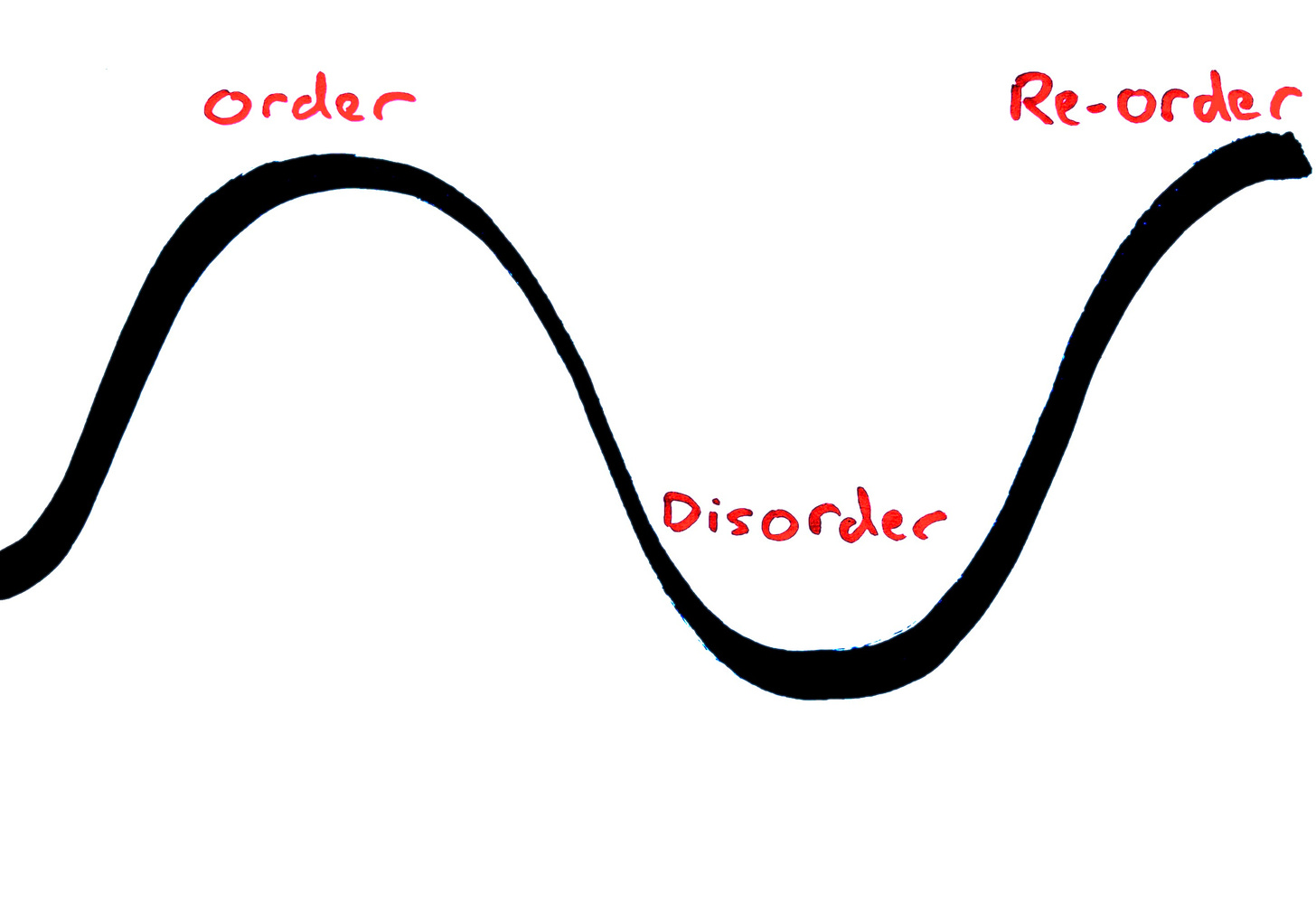
Rohr noted that most traditions try to keep you in the first box of “Order,” even when it doesn’t fit the facts or reality7. This stunts any kind of real transformation and development. We have to go through states of “disorder” in order to come out the other end of “re-order.”
As you are crossing between worlds, making significant decisions and changes in your life, take heed of the signs of our times, no matter how “self-improved” you may be. If you pay attention to what life asks out of you, you can then move and allow yourself “to be moved” towards a life that awaits for you.
May you come alive.
Reflection:
1. Where are you in this arc of life?
If you would like to learn more topics that can help your professional development, subscribe to the Frontiers of Psychotherapist Development (FPD). On Frontiers Friday (FPD), we serve you directly to your Inbox highly curated recommendations each week.

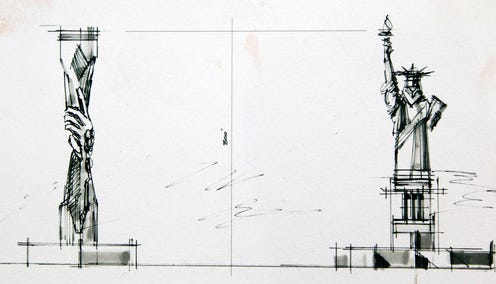
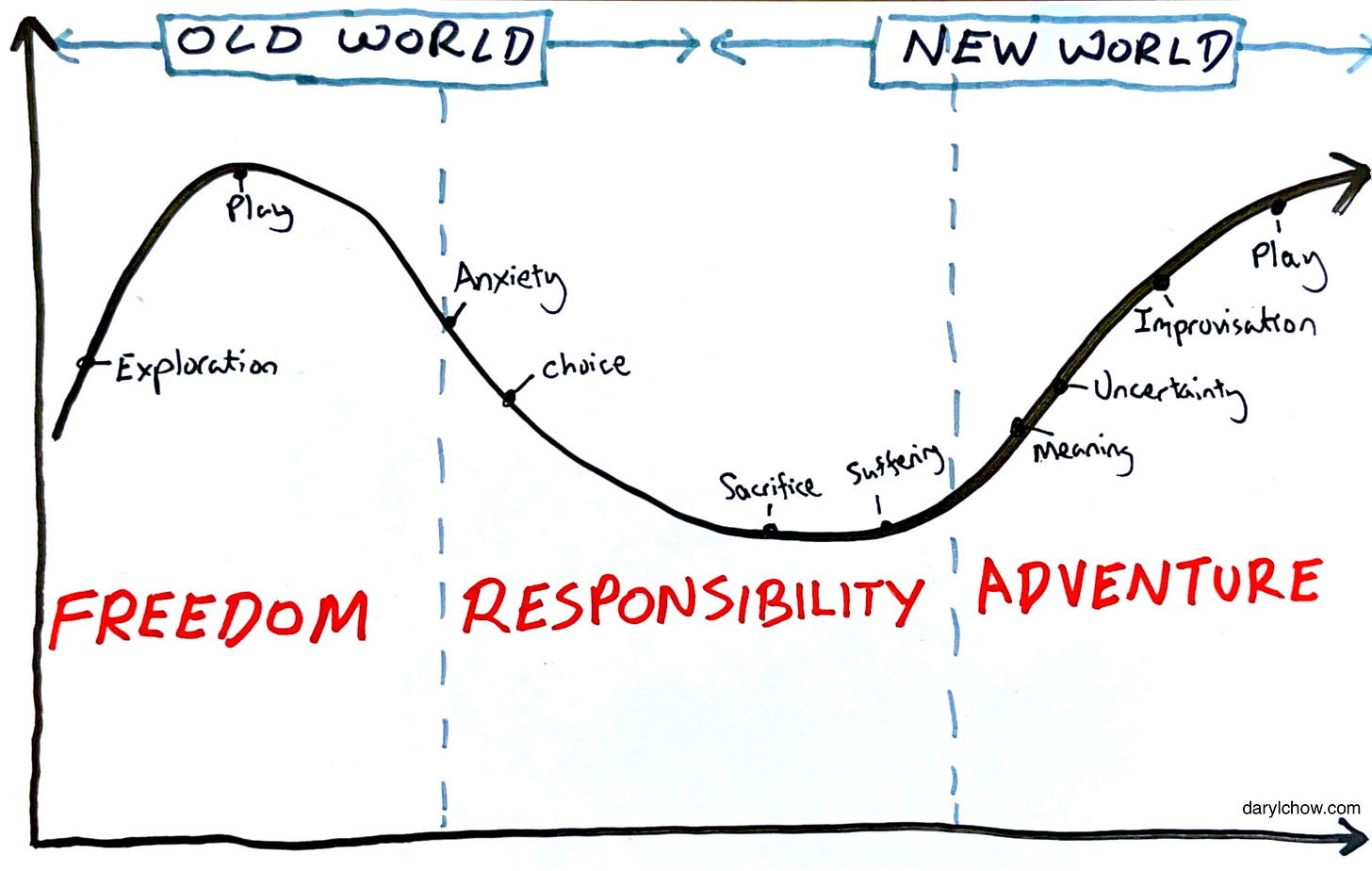
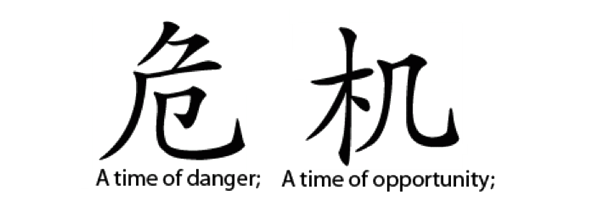


Recent Comments